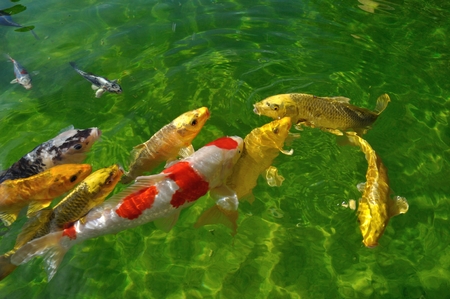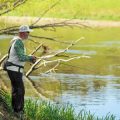Introduction to UK Rod Licences
For anyone passionate about fishing in the United Kingdom, understanding rod licences is absolutely essential. A rod licence is a legal permit required by anglers who wish to fish for freshwater species such as salmon, trout, and coarse fish in rivers, lakes, canals, and streams across England and Wales. Issued by the Environment Agency, this document not only ensures you are fishing within the law but also supports vital conservation work and the upkeep of fisheries. Failing to have a valid rod licence can lead to hefty fines, confiscation of equipment, or even prosecution.
Why Do Anglers Need a Rod Licence?
The primary purpose of the rod licence is to regulate fishing activities and help protect aquatic environments. Revenue generated from licences directly funds fish stocking programmes, habitat restoration projects, and enforcement patrols. By holding a rod licence, every angler plays a role in maintaining healthy waters and sustainable fish populations for future generations.
Consequences of Fishing Without a Licence
| Offence | Potential Consequence |
|---|---|
| Fishing without a valid rod licence | Fines up to £2,500 |
| Repeated offences | Prosecution & possible criminal record |
| Seizure of fishing tackle | Confiscation of rods and equipment |
Whether you’re a seasoned angler or just starting out, securing your rod licence is the first step towards enjoying your time by the water legally and responsibly. In the following sections, we’ll break down everything you need to know about applying for a rod licence, types available, costs involved, and key regulations every UK angler must follow.
2. Types of Rod Licences and What They Cover
When fishing in the UK, selecting the right rod licence is crucial to ensure you’re both compliant with the law and getting the best value for your angling style. The Environment Agency offers several types of rod licences, primarily categorised by the species you intend to fish for and the method you use. Here’s a breakdown of the main types available:
| Licence Type | Covers | Best For |
|---|---|---|
| Coarse Fish Licence | All freshwater fish except salmon and trout (e.g., carp, bream, perch) | General anglers fishing lakes, canals, and rivers for non-salmonid species |
| Trout & Coarse Licence | Trout, char, coarse fish, eel; excludes salmon | Those targeting trout as well as coarse species in rivers and stillwaters |
| Salmon & Sea Trout Licence | All freshwater fish including salmon, sea trout, brown trout, and coarse fish | Anglers specifically pursuing migratory salmonids alongside other species |
Duration Options
Each licence type comes with flexible duration choices—typically annual, 8-day, or 1-day licences—to suit everyone from occasional weekend anglers to dedicated year-round enthusiasts.
Who Needs Which Licence?
- If you’re mainly after carp or tench in local ponds or canals, a Coarse Fish Licence will suffice.
- If you enjoy switching between trout streams and general coarse waters, opt for the Trout & Coarse Licence.
- If your passion lies in chasing wild Atlantic salmon or sea trout on British rivers, then only the Salmon & Sea Trout Licence will cover your needs.
Youth and Concessions
A key detail worth noting: juniors under 13 don’t need a licence at all, while discounted rates apply for young people aged 13-16 and seniors over 65. Always check the latest eligibility criteria before purchasing.

3. Where and How to Get Your Rod Licence
Securing your rod licence in the UK is a straightforward process, with options designed to suit every angler’s needs—whether you’re a seasoned coarse fisher or just starting out. Here’s some practical advice on where and how to obtain your rod licence, as well as what documents you’ll need for a smooth purchase.
Online Purchase: The Fastest and Easiest Option
Most anglers these days opt for buying their rod licence online through the official GOV.UK fishing licence portal. This method is not only convenient but also ensures you receive instant confirmation via email—ideal if you’re keen to hit the water without delay.
Steps to Buy Online
- Visit the official GOV.UK website for rod licences.
- Select your preferred licence type (e.g., annual, 8-day, or 1-day).
- Fill in your personal details (name, address, date of birth).
- Provide proof of age or concession eligibility if required (for example, if you’re under 16 or over 65).
- Pay securely using a debit or credit card.
In-Person Options: Local Post Offices
If you prefer traditional methods, licences are still available at many local post offices across England and Wales. This can be particularly handy if you like to speak directly to someone or pay in cash. You’ll need basic identification details—such as your name and address—and any supporting documents if applying for a discounted or junior licence.
Where You Can Buy Your Rod Licence
| Purchase Method | Location/Platform | Payment Options |
|---|---|---|
| Online | GOV.UK Website | Debit/Credit Card |
| In-Person | Local Post Office branches (England & Wales) | Cash, Debit/Credit Card |
| By Phone | Environment Agency’s customer service line | Debit/Credit Card |
Essential Documents and Details Required
- Name and address (as they appear on your identification)
- Date of birth (especially important for concessions or junior licences)
- E-mail address (for digital confirmation when purchasing online)
- Proof of eligibility for discounts or free licences (e.g., pensioner ID, student card, disability documentation)
If you’re purchasing on behalf of someone else—for example, a child or a relative—you’ll need their details and any relevant supporting documents as well. Once bought, keep either the digital copy on your phone or a printed version with you while fishing; it’s not uncommon for Environment Agency officers to request proof during spot checks on the bank.
4. Rules, Regulations, and Seasonal Restrictions
If you’re planning to fish in the UK, understanding the rules, regulations, and seasonal restrictions is absolutely essential. Not only does this ensure you stay on the right side of the law, but it also plays a crucial role in conserving our aquatic environments for future generations. Let’s break down what every angler needs to know.
Key Regulations All Anglers Must Follow
Whether you’re after coarse fish or salmonids, there are some common rules that apply across England, Wales, Scotland, and Northern Ireland:
- Rod Limit: With a standard Environment Agency rod licence in England and Wales, you may use up to two rods for coarse fishing, and one for salmon or trout. Additional licences are required for more rods.
- Permission: Having a rod licence is not enough—you must also have permission from the landowner or fishery.
- No Fishing Without a Licence: Fines can reach up to £2,500 if caught fishing without a valid licence.
Close Seasons & Regional Variations
The close season is a period when fishing is either restricted or not allowed at all to protect spawning fish. Here’s an overview by region and species:
| Region | Coarse Fish Close Season | Trout Close Season |
|---|---|---|
| England & Wales (Rivers) | 15 Mar – 15 Jun | Varies (generally Oct – Mar) |
| England & Wales (Stillwaters & Canals) | No close season* | Varies by local byelaws |
| Scotland | No statutory close season* | Varies (see local rules) |
| Northern Ireland | 1 Mar – 30 Jun (some waters) | Generally Nov – Feb |
*Some private fisheries may impose their own restrictions. Always check before you go.
Certain Waters May Have Additional Rules
- Certain stretches of water—especially SSSIs (Sites of Special Scientific Interest)—may have stricter access or catch regulations.
- Catch-and-release may be mandatory in some areas during specific periods.
Bag Limits and Catch Restrictions
Catching responsibly helps preserve stocks. Many waters now have daily bag limits or minimum size requirements. Below is an example for England and Wales:
| Species | Bag Limit / Size Restriction |
|---|---|
| Bass (sea fishing) | No retention between 1 Feb – 31 Mar; otherwise 2 per angler/day at min. 42cm* |
| Eel & Shad | No taking from any inland water (protected species) |
*Rules change regularly; always check the latest guidance from the Environment Agency or local authorities.
Your Responsibilities as an Angler
- Always carry your rod licence and proof of permission when on the bank.
- Treat all wildlife with respect—never leave litter or discarded tackle behind.
Being aware of these rules isn’t just about compliance—it’s about being a responsible steward of our treasured waterways. Stay informed and enjoy your angling experience to the fullest.
5. Costs, Validity, and Renewal Tips
Understanding the costs and validity of UK rod licences is essential for every angler aiming to stay on the right side of the law while getting the best value for money. The Environment Agency regularly updates its pricing, so it pays to check before each season. Below, you’ll find a practical overview of current fees, licence durations, available concessions, and some seasoned advice on smooth renewals.
Current Rod Licence Prices
| Type | Duration | Price (2024) |
|---|---|---|
| Trout & Coarse Fish (1 Rod) | 12 Months | £33.00 |
| Trout & Coarse Fish (up to 2 Rods) | 12 Months | £33.00 |
| Salmon & Sea Trout (up to 3 Rods) | 12 Months | £86.10 |
| 1-Day Licence (All Types) | 24 Hours | £6.60 – £12.60* |
| 8-Day Licence (All Types) | 8 Days | £13.20 – £28.30* |
*Prices vary depending on fish type and number of rods.
Discounts and Concessions
- Youths: Anglers aged 13-16 can get a free licence but must still register.
- Seniors: Those aged 65+ receive approximately 50% off standard annual prices.
- Disabled Anglers: Blue Badge holders or those receiving Disability Living Allowance are also eligible for reduced rates.
Licence Validity Explained
The standard annual rod licence is valid for 12 months from the date of purchase—no longer tied to the calendar year. This shift means greater flexibility for anglers starting at any point during the fishing season.
Tried-and-Tested Renewal Tips
- Set Reminders: Put a note in your phone or calendar a week before expiry; forgetting could mean an unwelcome fine if checked waterside.
- Online Renewal: The fastest method is via the official GOV.UK site—secure, quick, and you’ll get instant confirmation.
- Email Updates: Opt-in for renewal reminders during registration to avoid missing important dates.
- Check Your Details: Ensure your address and personal info are up-to-date to prevent any delays in receiving your new licence.
- If in Doubt, Ask: Local tackle shops or angling clubs are invaluable sources of current information and often have printed guides to help you navigate changes year-on-year.
The small investment in a valid rod licence not only keeps you legal but directly supports fishery management and conservation efforts across England and Wales—a win-win for the angling community.
6. Common Mistakes and FAQs from Seasoned Anglers
Even the most experienced anglers can stumble over UK rod licence regulations, especially with the ever-evolving rules and local nuances. Here’s a practical roundup of frequently asked questions and common pitfalls based on real-world angling experiences to help you stay compliant and enjoy your time on the water.
Common Mistakes to Avoid
| Mistake | Explanation | How to Avoid |
|---|---|---|
| Fishing Without a Valid Licence | Forgetting to renew or obtain a licence before heading out is surprisingly common. | Set annual reminders and purchase online in advance via GOV.UK or the Post Office. |
| Misunderstanding Licence Types | Using a coarse licence for trout/salmon waters (or vice versa) can lead to fines. | Double-check what species/waters your licence covers before fishing. |
| Fishing Out of Season | Certain species and waters have closed seasons; ignorance isn’t an excuse if caught. | Consult the Environment Agency’s closed season calendar regularly. |
| Not Carrying Proof of Licence | You’re required by law to show your licence if asked by a bailiff or officer. | Keep a digital copy on your phone or carry the physical licence at all times. |
| Lack of Local Knowledge | Bylaws can vary regionally, even between neighbouring rivers or lakes. | Check fishery signs and local club rules before wetting a line. |
Frequently Asked Questions (FAQs)
Do I need a licence for sea fishing?
No rod licence is required for sea fishing from the shore or boat in UK waters. However, be aware that some estuaries may require one if targeting migratory species like salmon or sea trout.
Can juniors fish without a rod licence?
Anglers under 13 do not need a rod licence. Those aged 13-16 require a junior free rod licence but must still register online before fishing.
If I lose my physical licence, what should I do?
You can request a replacement through the Environment Agency website or present your email confirmation as proof of purchase when approached by enforcement officers.
Is my English/Welsh rod licence valid in Scotland or Northern Ireland?
No – each country has its own system. Ensure you obtain the correct local permit before fishing outside England or Wales.
I’m only fishing catch-and-release. Do I still need a licence?
Yes, all anglers must hold a valid rod licence regardless of whether fish are kept or released.
Pro Tip:
If in doubt, always ask at your local tackle shop – seasoned staff often know the latest rule changes and local quirks that could save you hassle down the line.
Avoiding these frequent mistakes not only keeps you within the law but also ensures you remain part of Britain’s thriving, responsible angling community. Tight lines!


